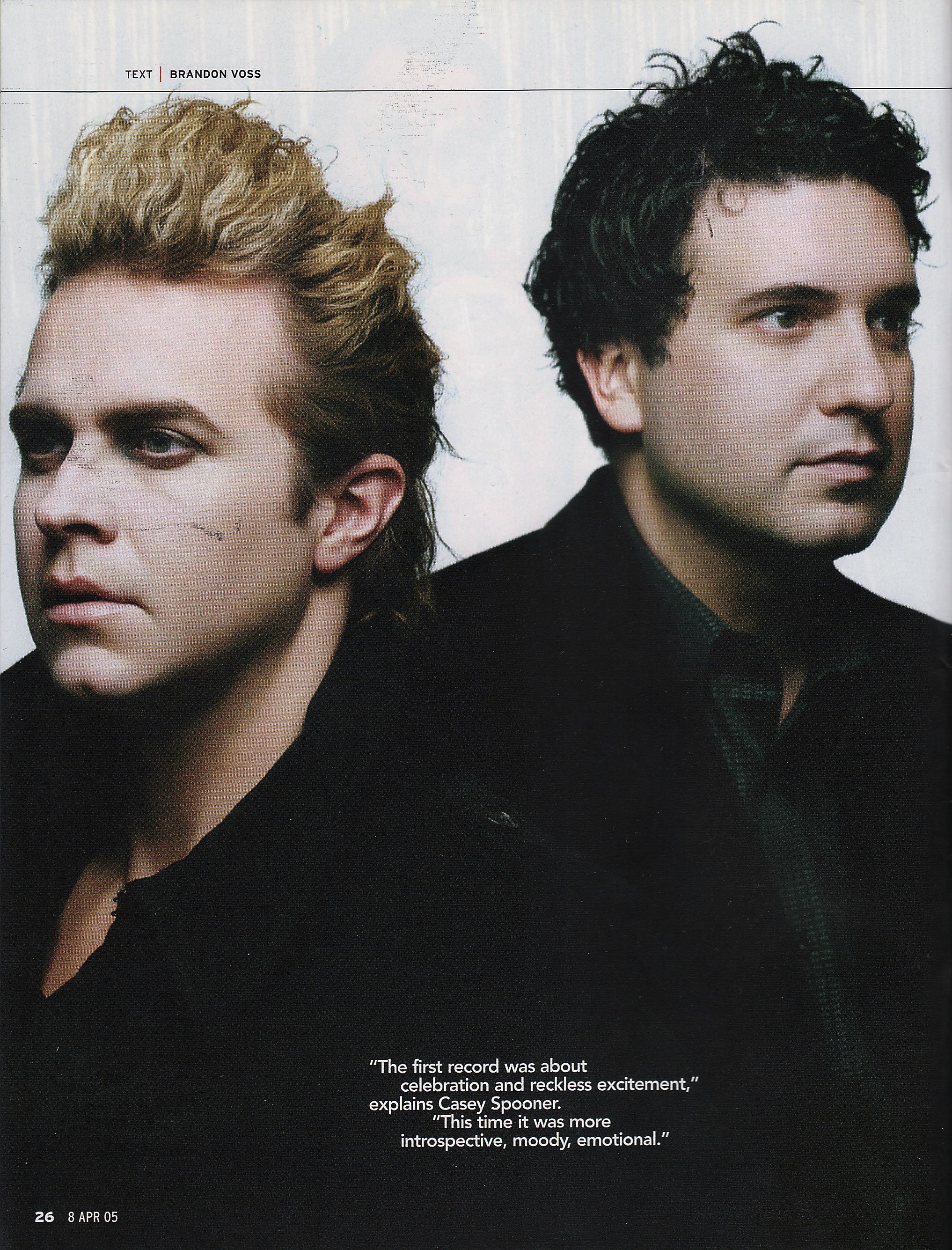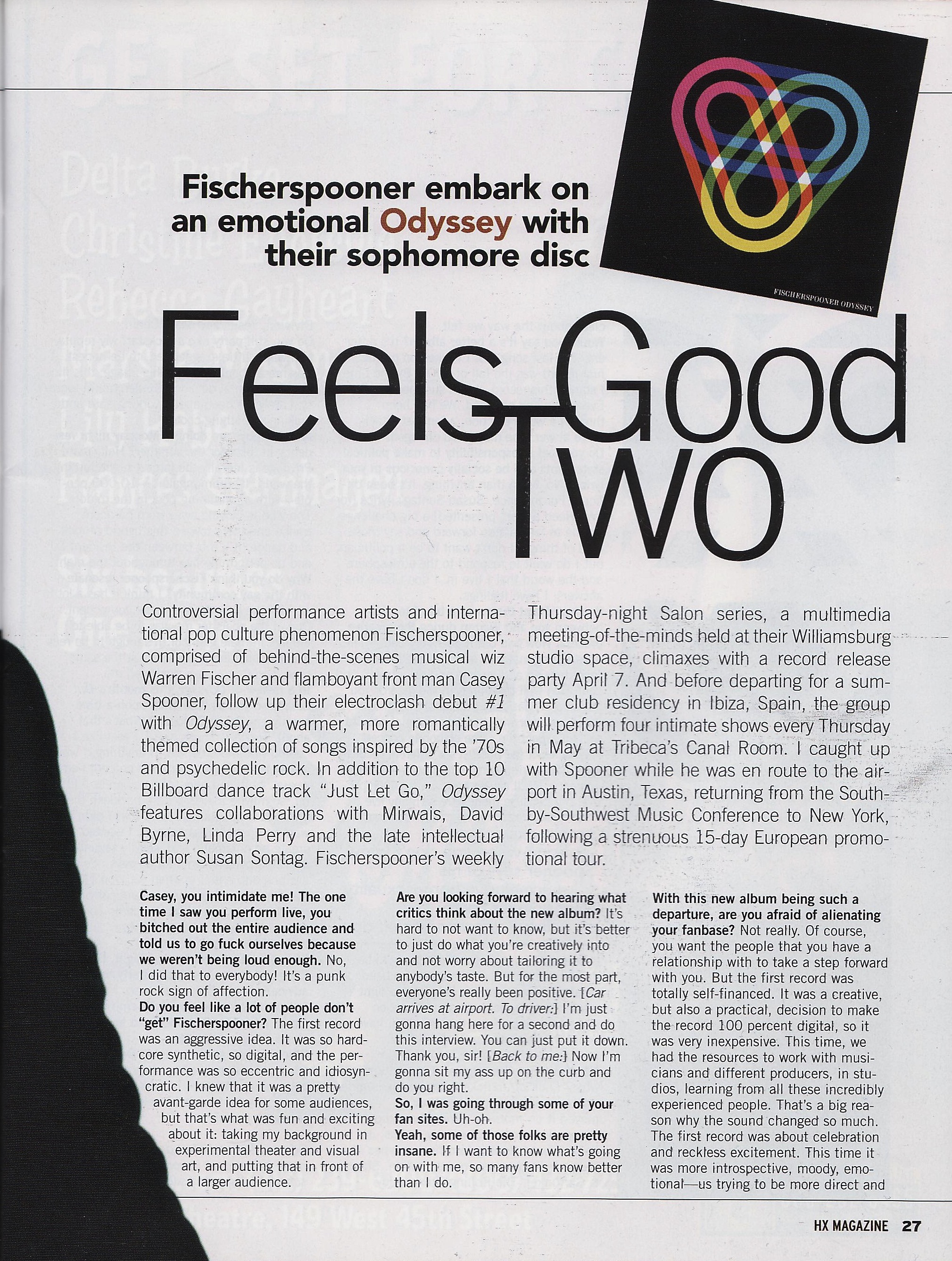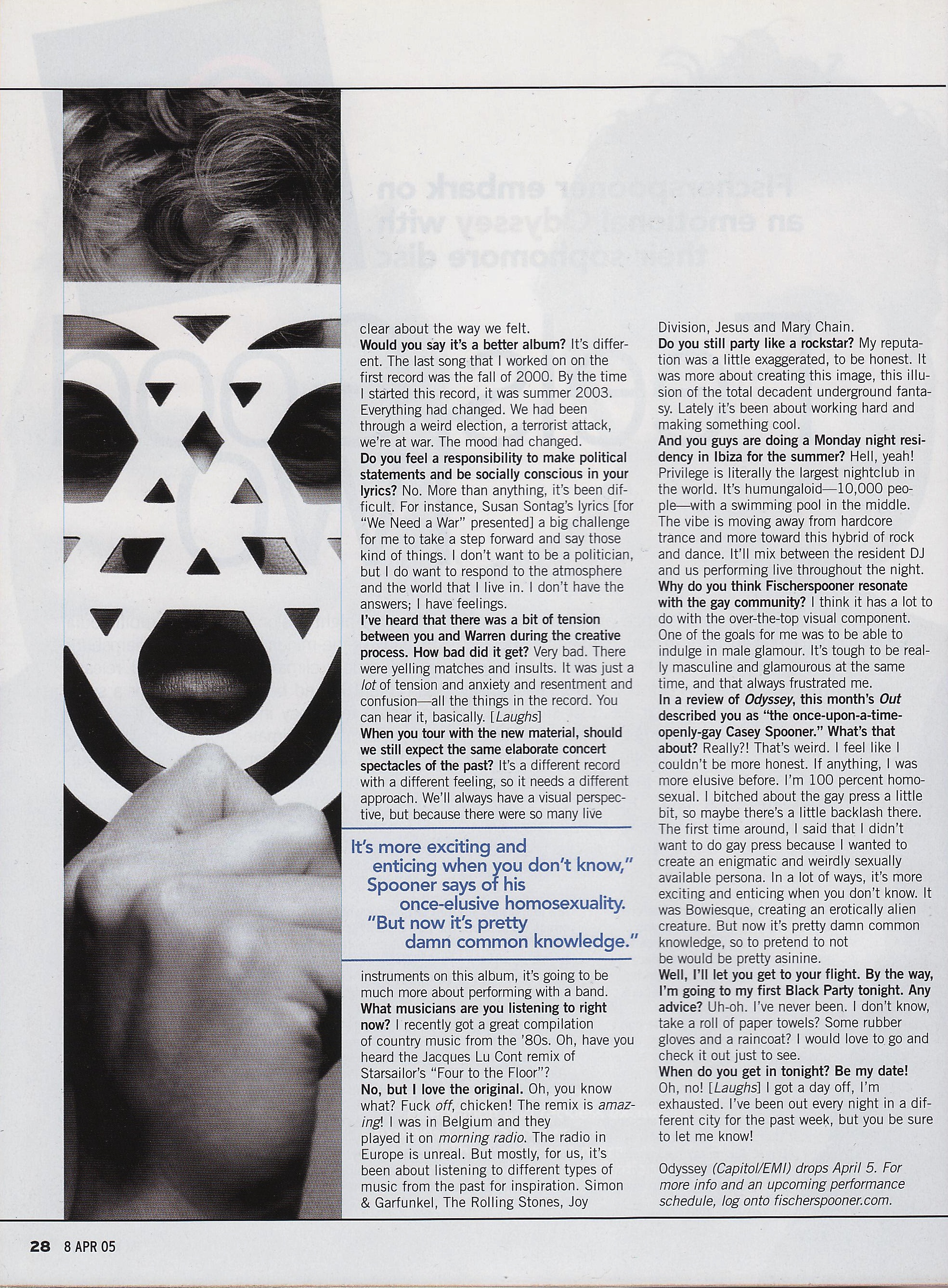


Fischerspooner embarks on an emotional Odyssey with their sophomore disc.
By Brandon Voss
Controversial performance artists and international pop culture phenomenon Fischerspooner, comprised of behind-the-scenes musical wiz Warren Fischer and flamboyant frontman Casey Spooner, have followed up their electroclash debut, #1, with Odyssey, a warmer, more romantically themed collection of songs inspired by the ’70s and psychedelic rock. In addition to top 10 Billboard dance track “Just Let Go,” Odyssey features collaborations with Mirwais, David Byrne, Linda Perry, and late intellectual author Susan Sontag.
Fischerspooner’s weekly Thursday-night Salon series, a multimedia meeting-of-the-minds held at their Williamsburg studio space, climaxes with a record release party April 7. Before departing for a summer club residency in Ibiza, the group will perform four intimate shows every Thursday in May at Tribeca’s Canal Room.
I caught up with Spooner while he was en route to the airport in Austin, returning to New York City from the South by Southwest Music Conference, following a strenuous 15-day European promotional tour.
HX: Casey, you intimidate me! The one time I saw you perform live, you bitched out the entire audience and told us to go fuck ourselves because we weren’t being loud enough.
Casey Spooner: No, I did that to everybody! It’s a punk rock sign of affection.
Do you feel like a lot of people don’t “get” Fischerspooner?
The first record was an aggressive idea. It was so hardcore synthetic, so digital, and the performance was so eccentric and idiosyncratic. I knew that it was a pretty avant-garde idea for some audiences, but that’s what was fun and exciting about it: taking my background in experimental theater and visual art, and putting that in front of a larger audience.
Are you looking forward to hearing what critics think about the new album?
It’s hard to not want to know, but it’s better to just do what you’re creatively into and not worry about tailoring it to anybody’s taste. But for the most part, everyone’s really been positive. [Car arrives at airport. To driver:] I’m just gonna hang here for a second and do this interview. You can just put it down. Thank you, sir! [Back to me:] Now I’m gonna sit my ass up on the curb and do you right.
So I was going through some of your fan sites.
Uh-oh. Yeah, some of those folks are pretty insane. If I want to know what’s going on with me, so many fans know better than I do.
With this new album being such a departure, are you afraid of alienating your fanbase?
Not really. Of course, you want the people that you have a relationship with to take a step forward with you. But the first record was totally self- financed. It was a creative, but also a practical, decision to make the record 100 percent digital, so it was very inexpensive. This time, we had the resources to work with musicians and different producers, in studios, learning from all these incredibly experienced people. That’s a big reason why the sound changed so much. The first record was about celebration and reckless excitement. This time it was more introspective, moody, emotional — us trying to be more direct and clear about the way we felt.
Would you say it’s a better album?
It’s different. The last song that I worked on on the first record was the fall of 2000. By the time I started this record, it was summer 2003. Everything had changed. We had been through a weird election, a terrorist attack, we’re at war. The mood had changed.
Do you feel a responsibility to make political statements and be socially conscious in your lyrics?
No. More than anything, it’s been difficult. For instance, Susan Sontag’s lyrics [for “We Need a War” presented] a big challenge for me to take a step forward and say those kind of things. I don’t want to be a politician, but I do want to respond to the atmosphere and the world that I live in. I don’t have the answers; I have feelings.
I’ve heard that there was a bit of tension between you and Warren during the creative process. How bad did it get?
Very bad. There were yelling matches and insults. It was just a lot of tension and anxiety and resentment and confusion — all the things in the record. You can hear it, basically. [Laughs.]
When you tour with the new material, should we still expect the same elaborate concert spectacles of the past?
It’s a different record with a different feeling, so it needs a different approach. We’ll always have a visual perspective, but because there were so many live instruments on this album, it’s going to be much more about performing with a band.
What musicians are you listening to right now?
I recently got a great compilation of country music from the ’80s. Oh, have you heard the Jacques Lu Cont remix of Starsailor’s “Four to the Floor”?
No, but I love the original.
Oh, you know what? Fuck off, chicken! The remix is amazing! I was in Belgium and they played it on morning radio. The radio in Europe is unreal. But mostly, for us, it’s been about listening to different types of music from the past for inspiration. Simon & Garfunkel, The Rolling Stones, Joy Division, Jesus and Mary Chain.
Do you still party like a rock star?
My reputation was a little exaggerated, to be honest. It was more about creating this image, this illusion of the total decadent underground fantasy. Lately it’s been about working hard and making something cool.
And you guys are doing a Monday night residency in Ibiza for the summer?
Hell, yeah! Privilege is literally the largest nightclub in the world. It’s humungaloid — 10,000 people — with a swimming pool in the middle. The vibe is moving away from hardcore trance and more toward this hybrid of rock and dance. It’ll mix between the resident DJ and us performing live throughout the night.
Why do you think Fischerspooner resonates with the gay community?
I think it has a lot to do with the over-the-top visual component. One of the goals for me was to be able to indulge in male glamour. It’s tough to be really masculine and glamorous at the same time, and that always frustrated me.
In a review of Odyssey, this month’s Out described you as “the once-upon-a-time-openly-gay Casey Spooner.” What’s that about?
Really?! That’s weird. I feel like I couldn’t be more honest. If anything, I was more elusive before. I’m 100 percent homosexual. I bitched about the gay press a little bit, so maybe there’s a little backlash there. The first time around, I said that I didn’t want to do gay press because I wanted to create an enigmatic and weirdly sexually available persona. In a lot of ways, it’s more exciting and enticing when you don’t know. It was Bowiesque, creating an erotically alien creature. But now it’s pretty damn common knowledge, so to pretend to not be would be pretty asinine.
HX, April 2005.
